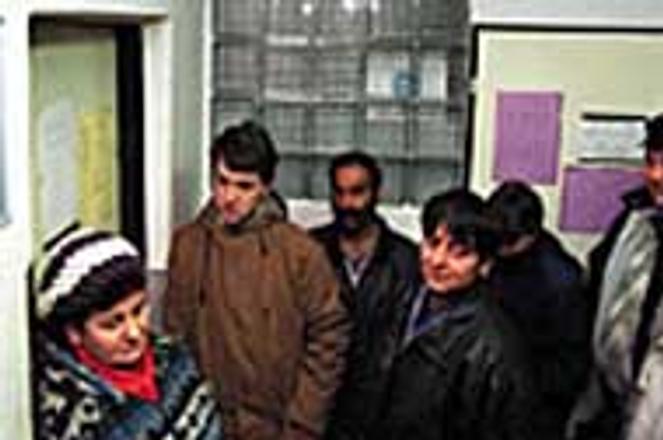Lines at unemployment offices like this one are expected to be reduced under the new Employment Law.photo: TASR
An amendment to the employment law passed by parliament on July 3 redirecting funds from social welfare benefits into job creation schemes is set to revolutionise welfare for the unemployed and motivate unemployed people to look for permanent jobs more actively.
The revision is aimed directly at people who have been receiving unemployment aid for more than two years by cutting their benefits in half and freeing up money for job creation in the public sector. The move will see 2.3 billion crowns ($51.5 million) cut from social benefits to be redistributed for the creation of jobs in a wide range of economic sectors.
Under the new legislation, the long-term unemployed must also enlist in one of the newly created positions in order to receive full benefits. The law is expected to affect approximately 133,000 people throughout Slovakia and create an estimated 79,000 positions.
Those involved in drafting the legislation said that while the amendment was a short-term solution to a larger problem, it was one that would weed out those exploiting the system from those actively searching for employment.
"The main idea is that any work is better than receiving social benefits. The law was created for the target group of the long-term unemployed. For them, the amendment will find them suitable work and a greater possibility to join the permanent marketplace," said Edita Bauer, Deputy Minister of Labour, Social Affairs and Family.
Mária Nadazdyová, director of the social assistance section at the Ministry of Labour, said that the jobs created following the amendment would be mostly manual labour positions such as garbage collecting, street cleaning and assisting at state institutions. By offering jobs that are traditionally seen as lower-end positions in the job market, expectations are high that job seekers will in turn be motivated to seek out better paying long-term jobs.
"If we care for these people and we want them to be responsible and in control of their own fate, we have to offer them something. When they accept this type of work, they will show evidence that they are really looking to find work," Nadazdyová said.
Despite the optimism surrounding the new legislation, the cost of putting the law into practice has raised eyebrows. Martin Barto, head of strategy at state-owned bank Slovenská sporiteľňa, said that the administrative costs of the programme would eat into the money allocated to the fund. He also expressed concern regarding the long-term viability of the project. "I don't know what will happen to the jobs and the people [seeking unemployment] once this money runs out," he said.
Questions over the permanence of some of the new jobs to be created under the scheme was also an issue for Július Brocka, an MP for the Slovak Democratic Coalition (SDK), who actively supported the law in parliament. Brocka said that the speed at which the law was passed was evidence of its popularity, but that its timing had been poor, with many summer season positions already decided upon.
"It would have been better if this law had been proposed by the government sooner because most of these created positions are seasonal jobs, and now that it [the law] has [been] passed, there are only two or three months [of summer jobs] left," Brocka said.
However, Nadazdyová said that she was currently working with the employment department to create a longer term solution and a system to shift people into permanent positions.
The possibility that funds could be wasted - or worse - was also raised. "The labour office needs to watch very carefully how this money [for the project] is spent. In many cases, I think this is a task that is above the capabilities of the government and other offices," Barto added.
Job creation funds have been abused in the past: in 1998, the Centrogel company's Imrich Sládeček borrowed 22 million crowns from labour office funds to create new jobs at his firm. According to Interior Ministry investigators, Sládeček created the jobs and then fired the people he had hired, keeping the labour office money for himself. Last week, parliament stripped Sládeček of the immunity from prosecution he enjoys as an MP for the ruling Party of Civic Understanding (SOP).
Nadazdyová said that following the latest amendment, the distribution of funds would be administered by regional labour offices in cooperation with social affairs offices.


